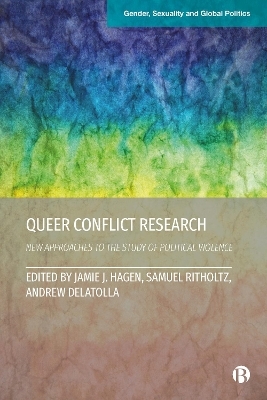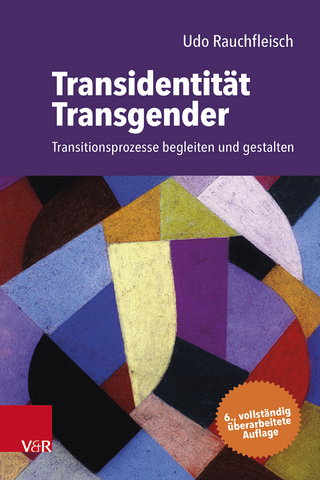
Queer Conflict Research
Bristol University Press (Verlag)
978-1-5292-2504-4 (ISBN)
Contributors provide illuminating discussions on why queer approaches are important, what they entail and how to utilise a queer approach to political violence and conflict. The chapters explore a variety of methodological approaches, including fieldwork, interviews, cultural analysis and archival research. They also engage with broader academic debates, such as how to work with research partners in an ethical manner.
Including valuable case studies from around the world, the book demonstrates how these methods can be used in practice. It is the first critical, in-depth discussion on queer methods and methodologies for research on political violence and conflict.
Jamie J. Hagen is Lecturer in International Relations at Queen's University Belfast where she is also the founding Co-Director of the Centre for Gender in Politics. Samuel Ritholtz is Departmental Lecturer in International Relations in the Department of Politics and International Relations at the University of Oxford in association with St Hilda’s College. Andrew Delatolla is Lecturer in Middle Eastern Studies at the University of Leeds.
Introduction: Telling Queer Stories of Conflict – Jamie J. Hagen, Samuel Ritholtz, Andrew Delatolla
Part 1: Queer Approaches to Conflict Research
1. The ‘Queer’ in Conflict Research As Subject, Structure, and Method: Initial Epistemological Considerations for the Early Career Researcher – Samuel Ritholtz
2. Queering the Politics of Knowledge in Conflict Research – Jose Fernando Serrano Amaya
3. Workshop As Queer Feminist Praxis: Insights From Colombian Queer and Trans Women Organising for Peace – Jamie J. Hagen
Part 2: Queer Methods of Conflict Research
4. The Visual As Queer Method – Dean Cooper-Cunningham
5. Poetry as a Queer Epistemological Method: Disrupting Knowledge of the Lebanese Civil War With Etel Adnan’s the Arab Apocalypse – Andrew Delatolla
6. Queer Tools for the Ruthless Archive: Methodological Notes on Trans and Queer History for Doing Archival Research – Patricio Simonetto
Part 3: Queer Experiences of Conflict Research
7. Researching Queer Lives in the Shadow of Northeast Nigeria’s Conflict – Chitra Nagarajan
8. Entangled Intimacies, Queer Attachments: Reflections on Fieldwork With a Diaspora of War – Ahmad Qais Munhazim
9. Doing NGO Research With Diverse Sogiesc Refugees in Lebanon, Syria and Turkey: A Conversation – Zeynep Pınar Erdem, Charbel Maydaa, Henri Myrttinen and Helena Berchtold
Conclusion: Thinking (of) Queer Conflict Research – Laura Sjoberg
Appendix I: Guide for Good Practices for Researching Queer and Trans Communities in Highly Sensitive Contexts – Cristian González Cabrera, Erin Kilbride, Kyle Knight, Yasemin Smallens, Rasha Younes
Appendix II: “The Emotional Work Is Part of the Work”: Strategies To Maintain Researcher Emotional and Psychological Safety During Challenging Fieldwork – Maureen Freed
| Erscheinungsdatum | 21.02.2024 |
|---|---|
| Reihe/Serie | Gender, Sexuality and Global Politics |
| Co-Autor | Chitra Nagarajan, Jose Fernando Serrano Amaya, Yasemin Smallens, Rasha Younes, Patricio Simonetto |
| Zusatzinfo | 9 Illustrations, black and white |
| Sprache | englisch |
| Maße | 156 x 234 mm |
| Themenwelt | Geisteswissenschaften ► Psychologie ► Sexualität / Partnerschaft |
| Sozialwissenschaften ► Soziologie ► Gender Studies | |
| Sozialwissenschaften ► Soziologie ► Mikrosoziologie | |
| ISBN-10 | 1-5292-2504-3 / 1529225043 |
| ISBN-13 | 978-1-5292-2504-4 / 9781529225044 |
| Zustand | Neuware |
| Informationen gemäß Produktsicherheitsverordnung (GPSR) | |
| Haben Sie eine Frage zum Produkt? |
aus dem Bereich


